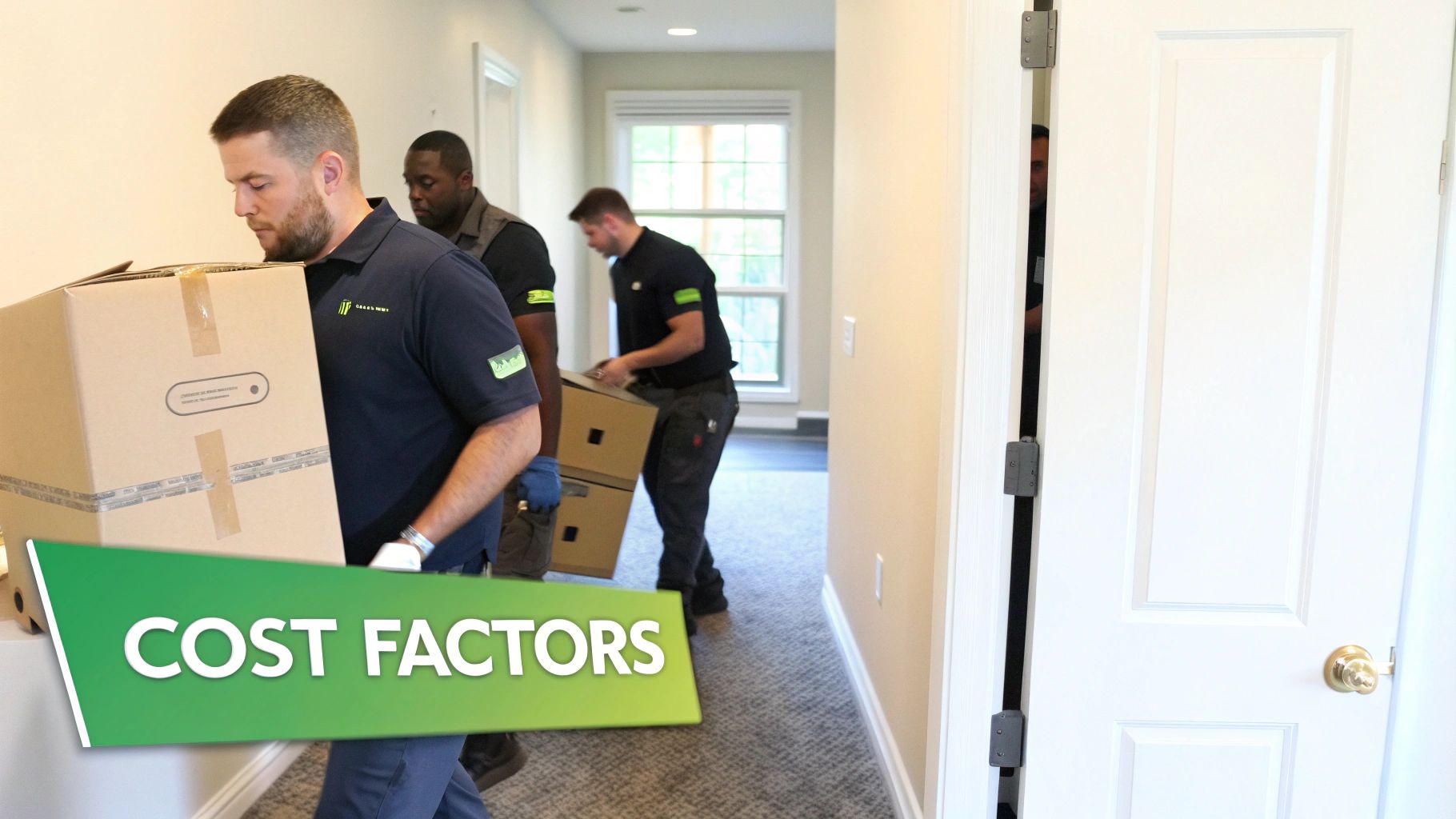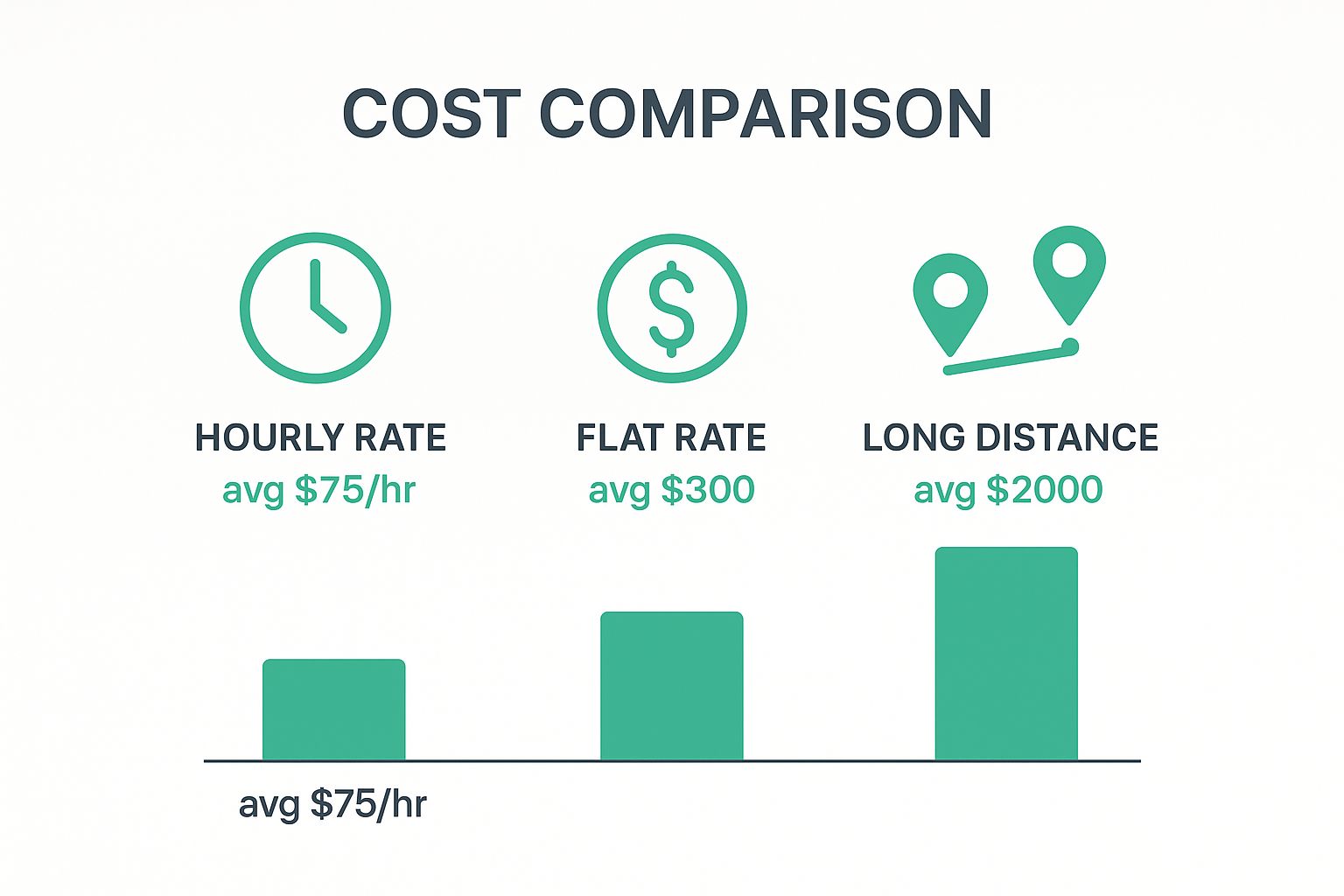Let's get straight to the point. The first question on everyone's mind when moving is, "What's this actually going to cost me?" For a standard local move in Perth, you're typically looking at a rate of $150 to $220 per hour. That gets you a professional two-person team and their truck, and usually includes the basics like labour and standard insurance.
It's a solid starting point for your budget, but just a starting point.
Your Guide to Perth Removalist Costs
Think of that hourly rate like the base price for a plane ticket. The final cost isn't just the fare; it's also about how much luggage you have, whether you want extra legroom, and when you fly. Your moving cost works the same way. The hourly rate is the foundation, but the total bill depends on how much stuff you have and any tricky aspects of your move.
Looking at the bigger picture, recent 2025 data shows Perth's prices are pretty competitive. Across Australia, you'll see local removalist rates bouncing anywhere from $100 up to $280 an hour. While you might find a deal in Canberra for as low as $80 an hour, the bigger cities like Sydney and Melbourne will almost always be on the higher end of that scale. Perth sits right in that comfortable middle ground. If you're curious about the national averages, there's a great cost breakdown on Airtasker.com.au worth checking out.
Average Costs by Property Size
So, what does that hourly rate translate to for your home? Let's break it down by property size to give you a more concrete idea of what to expect. These figures are based on the typical time and team needed for each scenario.
For a quick reference, here's a table that lays it all out.
Estimated Perth Removalist Costs at a Glance
| Property Size | Typical Team Size | Estimated Hourly Rate (Perth) | Estimated Total Cost (3-5 Hours) |
|---|---|---|---|
| Studio / 1-Bed Apt | 2 Movers | $150 – $220 | $300 – $660 |
| 2-Bed House / Apt | 2-3 Movers | $150 – $220 | $450 – $1,100 |
| 3-Bed Family Home | 3 Movers | $160 – $260 | $900 – $1,820 |
| 4+ Bed House | 4+ Movers | $180 – $280+ | $1,400 – $2,800+ |
Of course, a table gives you the averages. Here's a more detailed look at what that means in practice:
- Studio or 1-Bedroom Apartment: This is usually a straightforward job for two movers. Over a 2-3 hour window, you can expect the total to land somewhere between $300 and $660.
- 2-Bedroom House or Apartment: Stepping up in size, you'll likely need a two or three-person team for about 3-5 hours. Budget for a final cost in the range of $450 to $1,100.
- 3-Bedroom Family Home: For a standard family home, three movers are common. With the job taking around 5-7 hours, you should plan for a cost between $900 and $1,820.
- 4+ Bedroom House: These are the big moves. You'll want a team of four or more, and it could take anywhere from 7-10 hours. Costs here can easily start at $1,400 and climb to $2,800 or more.
It's crucial to remember that these are just ballpark figures. The final number on your invoice will be influenced by a bunch of other factors we'll dig into next. The real goal is to get a quote that reflects your specific move, not just a generic hourly rate you see online.
What Are You Actually Paying For?

When a removalist quote lands in your inbox, it's natural to skip straight to the bottom line. But if you really want to understand what you're paying for, you need to look closer. Think of it less like a single price tag and more like an itemised receipt from your local shop—each line item tells a story.
Breaking down a typical Perth removalist quote helps you compare apples with apples. It's the best way to see what's included, spot any potential red flags, and avoid nasty surprises on moving day.
The Core Components of Your Quote
The heart of nearly every local moving quote is the hourly rate. But this single figure isn't just a number plucked from thin air; it’s a combination of the essential services needed to get your life from Point A to Point B safely and efficiently.
Here’s what’s usually bundled into that rate:
- Labour (Per Mover, Per Hour): This is for the team's professional time, skill, and sheer hard work. A two-person crew is the standard for most apartments and smaller homes, but you might need three or four for a larger house packed with belongings.
- The Truck Fee: This covers the vehicle itself, plus the fuel to get it there and back, general wear and tear, and all the essential gear like trolleys, straps, and protective blankets. Sometimes it's baked into the hourly rate, other times it might be a separate line item.
- Minimum Booking Time: To make any job worthwhile, most removalists have a minimum charge. In Perth, this is usually 2 to 3 hours. So, even if your move is lightning-fast, you'll almost certainly be billed for this minimum period.
These elements come together to create your base price. So, when you see a quote for "$160 per hour for 2 men and a truck," you now know it’s a package deal covering all these fundamental costs.
Understanding Extra Charges and Fees
Beyond that base rate, other fees can pop up depending on the unique challenges of your move. Knowing about these ahead of time is absolutely critical for keeping your budget on track.
Key Takeaway: A good, transparent quote will always detail any potential extra charges. If a quote feels a bit vague or too good to be true, it’s your cue to ask more questions. A reputable mover wants you to be informed, not shocked.
Some of the common surcharges you might see include:
- Call-Out Fee: A one-off charge that covers the crew's travel time and fuel from their depot to your front door. This can be anywhere from $50 to $150.
- Travel Surcharge: If your move starts or ends well outside the main Perth metro area, you might face a travel fee to compensate for the extra kilometres and time on the road.
- Stairs or Difficult Access Fee: Got a tricky apartment on the third floor with no lift? Or a long, winding path from the street to your house? An extra fee might apply to cover the significant additional effort and time required.
Knowing what to ask is half the battle. For more guidance, it’s worth checking out our guide on the 11 questions to ask when hiring a removalist. What we're seeing in Perth aligns with the national average—a standard local move with two movers and a truck typically costs $140-$180 per hour, with that common 2-3 hour minimum booking.
Factors That Influence Your Final Moving Cost

You’ve seen the hourly rates, but have you ever wondered why two moves that look the same on paper can have wildly different final bills? It all comes down to the details. A handful of key factors can either nudge your total moving cost up or bring it down, and getting your head around them is the best way to manage your budget.
Think of the hourly rate as just the starting price. The specifics of your move are what really shape the final figure. The more complex the job, the more it will cost. Knowing what these variables are ahead of time helps you anticipate the real cost and make smart choices to keep your expenses on track.
The Volume and Nature of Your Belongings
It might sound obvious, but the biggest factor is simply how much stuff you have. More belongings mean more time packing the truck, more space needed, and sometimes, a bigger crew to get it all done. A lightly furnished one-bedroom flat is a world away from a four-bedroom family home packed with a lifetime of possessions.
But it’s not just about the sheer amount of stuff; the kind of items you have is just as important.
- Heavy or Bulky Items: Got a solid jarrah dining table, a heavy stone-top coffee table, or a sofa that just won’t fit through the door easily? These things take serious muscle and careful manoeuvring, which adds time to the clock.
- Specialty Items: Pianos, pool tables, and hefty gun safes are in a league of their own. They need special equipment and handling skills, which almost always means a separate, fixed fee on top of the hourly rate.
- Fragile or High-Value Items: Antiques, large artworks, and sensitive electronics need a gentle touch. They require extra time for careful wrapping and securing in the truck, which naturally extends the job's duration.
Property Access and Location Challenges
How easy is it for the removalists to get your furniture from inside your home to the back of their truck? The route they have to walk plays a massive role in how long the move takes. In my experience, difficult access is one of the most common reasons a final bill is higher than the initial quote.
Your home's layout can directly impact the time on the clock. A ground-floor house with a driveway right by the door is the ideal scenario. Anything else adds time, and therefore, cost.
Think about these common access hurdles:
- Stairs: Hauling box after box up or down several flights of stairs is tough work. It’s significantly slower and more physically demanding than working on a single level or using a lift.
- Lifts: While certainly better than stairs, using a lift still takes time. It adds up, especially if the lift is slow, small, or has to be shared with other building residents.
- Long Walkways: If the truck has to park a long way from your front door, every single item has to be carried that extra distance. Those minutes add up fast over dozens of trips back and forth.
By taking a moment to consider how your property's layout might affect the job, you can get a much more realistic idea of the time involved. For an even more detailed breakdown of pricing, check out our guide to the typical Perth removalists hourly rate.
Local Perth Moves vs Interstate Relocations
Moving across town feels worlds apart from moving across the country, and that’s definitely true when it comes to how much removalists cost. The entire way your move is priced changes completely depending on the distance, which can make a huge difference to your final bill. Getting your head around this is the first step to setting a realistic budget for your big day.
For local moves—say, from Joondalup down to Fremantle—the billing is refreshingly simple. It’s all about time. Removalists will give you an hourly rate for their crew and the truck, and your total cost is a straight-up calculation of how many hours the job takes from start to finish.
Interstate relocations, like a massive haul from Perth to Brisbane, are a whole different ball game. Here, the price has very little to do with the hours worked on the day. Instead, it’s about two big things: volume and distance. The company will work out the total cubic metres (m³) your belongings take up and charge you based on that figure, multiplied by the huge distance everything has to travel.
Comparing Pricing Models
So, how does this play out in practice? For a local move, you can directly influence the cost by being super organised and ready to go. The quicker they can load and unload, the less you pay. For an interstate move, the best way to control the cost is by decluttering. Every single item you decide to keep adds to the total volume, and therefore, the final price tag.
This image gives a great visual breakdown of how the pricing scales up from a simple hourly job to a complex long-distance move.

As you can see, the jump from a local job to a cross-country relocation is pretty dramatic.
To really illustrate this, let’s compare these two very different moves.
Cost Comparison Local vs Interstate Move (from Perth)
The table below breaks down the key differences in how pricing is structured and what you can expect to pay for a standard 3-bedroom home.
| Feature | Local Move (e.g., Perth Metro) | Interstate Move (e.g., Perth to Melbourne) |
|---|---|---|
| Primary Pricing Factor | Time (Hourly Rate) | Volume (m³) & Distance (km) |
| Typical Billing Model | $180 – $220 per hour for 2-3 movers and a truck. | A fixed quote based on the size of your inventory. |
| Average Job Duration | 4-8 hours | 5-10 business days (including transit time) |
| Estimated Cost Range | $720 – $1,760 | $4,500 – $8,000+ |
| Key Cost Influences | Property access, stairs, level of preparation, travel time between properties. | Amount of furniture, fuel levies, insurance, storage needs, specific routes. |
As you can see, you’re paying for two fundamentally different services: a few hours of labour versus a complex, multi-day logistical operation.
A Tale of Two Moves
Let’s put this into a real-world scenario. Imagine you're moving the contents of a standard three-bedroom house.
Local Move (Joondalup to Fremantle): This is a trip of around 45 km. A crew of three movers might take 6-8 hours, including travel. At an average rate of $200/hour, you’d be looking at a total cost somewhere between $1,200 and $1,600.
Interstate Move (Perth to Brisbane): Now we’re talking about a massive 4,300 km journey. The same three-bedroom house (which is usually about 30-40m³ of goods) is no longer priced by the hour. The quote will cover the volume, distance, fuel, two sets of driving crews, and all the cross-state logistics involved.
The financial leap is enormous. Data for 2025 shows that an interstate move for a typical three-bedroom home in Australia can range from $2,600 to $5,850. This really highlights what you're paying for—local labour for a day versus a complex, long-haul service that spans the continent. If you're interested in the nitty-gritty of national moving expenses, there's a complete guide to 2025 moving costs at bestratedtransport.com.au that breaks it down further.
At the end of the day, while both are technically "moves," their pricing models couldn't be more different. Knowing which one applies to you is the key to forecasting your costs accurately and avoiding any nasty surprises.
Right, so you've got a handle on what Perth removalists generally charge. But knowing the numbers is one thing; actively shrinking that final bill is another game entirely. The great news is you're not just a passenger here—you're in the driver's seat. A little bit of smart planning and prep work can genuinely shave a decent chunk off the total cost, all without having to skimp on a quality moving team.
It all boils down to one word: efficiency. Since most local moves are charged by the hour, every minute you save is literal money back in your pocket. The mission, should you choose to accept it, is to make the removalists' job as quick and seamless as possible.
Declutter Before You Even Think About Getting Quotes
Here's the single most powerful tip I can give you: move less stuff. It’s that simple. Less volume means less time spent loading the truck, potentially a smaller and cheaper truck, and a much faster process overall. So, before you even pick up the phone to get a quote, it's time to get ruthless.
Walk through every single room and be honest with yourself about what you actually need and love. You’ve got a few options:
- Sell: Jump on online marketplaces to offload furniture, electronics, or clothes that are just gathering dust.
- Donate: Give items that are still in good nick to your local charity shop.
- Discard: Responsibly get rid of anything that’s broken, worn out, or unusable.
By decluttering, you’re not just saving cash on the move. You're giving yourself a fresh start in your new home, surrounded only by the things that matter. Honestly, this one step alone can easily cut an hour or more off your moving time, which translates directly into savings.
What about those "maybe" items you're not ready to part with but don't need right now? To reduce the load for your removalists, you could look into self-storage. Options like storage locker systems can be a really practical way to handle smaller belongings without cluttering up your new space.
Get Smart with Your Scheduling and Packing
When it comes to booking a move, timing can make a huge difference. Weekends, the end of the month, and school holidays are peak times for removalists, and prices often reflect that demand. If you have some flexibility, booking your move on a weekday (Monday to Thursday) can often mean lower hourly rates or access to special off-peak deals. It never hurts to ask the moving company directly if they have better pricing for mid-week slots.
Also, while having professionals pack for you is a fantastic service, doing it yourself is a guaranteed way to cut costs. If you go the DIY route, make sure every last thing is boxed up, taped shut, and clearly labelled before the movers walk through the door. This allows them to start loading immediately instead of standing around while you're still scrambling with the tape gun.
Taking the time to dismantle big items like bed frames and dining tables yourself will also slash the time they need to spend on the job. The more organised you are, the smoother the day will go, which is key to a stress-free transition. To help you keep track of all the little details, our moving house change of address checklist is an absolute lifesaver.
Finding Value Beyond the Lowest Price

When you're sifting through removalist quotes, it’s so easy to let your eyes lock onto the lowest number. But here's a hard-won lesson from years in the industry: when you're moving your entire life, the cheapest option can quickly become the most expensive headache.
True value isn't just about the final bill. It's about finding a company you can genuinely trust to make your move smooth and stress-free. A price that seems too good to be true often is—it might signal a lack of proper insurance, inexperienced movers, or a nasty habit of tacking on hidden fees when you're most vulnerable. Think of a reputable removalist as an investment in your own peace of mind.
Due Diligence Before You Dial
Before you book anyone, a little bit of homework can save you a world of trouble. This simple vetting process is your best defence against a moving day disaster, ensuring you partner with a truly professional team.
First things first: check their insurance. Don't just take their word for it. A professional company will have no problem showing you proof of their Public Liability and Transit Insurance. This is your non-negotiable safety net. Without it, you’re left with very few options if something gets damaged.
Next, get a feel for their reputation by reading recent customer reviews. Check out Google and their social media pages to see what real customers are saying. Are they consistently praised for being on time, careful, and professional? While a couple of negative comments are normal for any business, a clear pattern of complaints about broken items or surprise charges is a massive red flag.
A professional removalist operates with complete transparency. They should be able to clearly explain their insurance policies, break down any potential extra charges, and give you a detailed written quote. If they get defensive or vague with their answers, it's time to move on.
Key Questions to Ask
Once you've narrowed it down to a few contenders, it's time to pick up the phone. How a company answers your questions tells you almost everything you need to know about the service you can expect.
Here are the essential questions you should be asking every single potential removalist:
- Is your quote all-inclusive? Be direct. Ask about extra charges for things like stairs, tricky access, or even fuel levies.
- What is your process for handling damages? You need to understand their claims policy before you book, not after something has already gone wrong.
- Are your movers full-time employees or subcontractors? Companies that directly employ their staff usually offer better training and greater accountability.
- Is all your equipment, like protective blankets and trolleys, included in the price? The last thing you want is a surprise fee for basic gear on moving day.
Asking these questions helps you compare what removalists really cost, not just their advertised rate. It ensures you’re choosing a reliable partner, not just a cheap price tag.
Of course. Here is the rewritten section, designed to sound like an experienced professional sharing their knowledge in a natural, human-written style.
Your Perth Moving Questions, Answered
Once you start digging into the details of moving costs, a few common questions always seem to pop up. We get it – there's a lot to consider. Here are some straight answers to the queries we hear most often from people moving in and around Perth.
Is Tipping Removalists a Thing in Australia?
Honestly, tipping isn't a standard part of the culture here in Australia. Your movers are paid a proper wage for their work, so it's absolutely not expected.
That said, if the crew has gone above and beyond and you're blown away by their service, a tip is a fantastic way to show your appreciation. It’s always gratefully received. Even just offering some cold drinks on a scorching Perth day or having a few snacks on hand goes a long way – it's a simple gesture that never fails to lift the team's spirits.
Will I Pay Extra for Pianos or Pool Tables?
Yes, you definitely will. Items like pianos, pool tables, oversized marble tabletops, or commercial-grade gym equipment fall into a special category. They aren't just heavy; they're awkward, delicate, and require specific know-how and gear to move without causing damage to the item, your old house, or your new one.
This is one of the most important things to get right: always mention these specialty items when you’re getting a quote. Hiding a piano until moving day is a recipe for disaster and surprise fees. Being upfront allows the moving company to give you an accurate, fixed price for that specific item and ensure they bring the right equipment and an extra set of hands if needed.
Ready to make your Perth move simple and stress-free? At Emmanuel Transport, we provide transparent quotes with no hidden fees. Get your free, no-obligation quote today!












